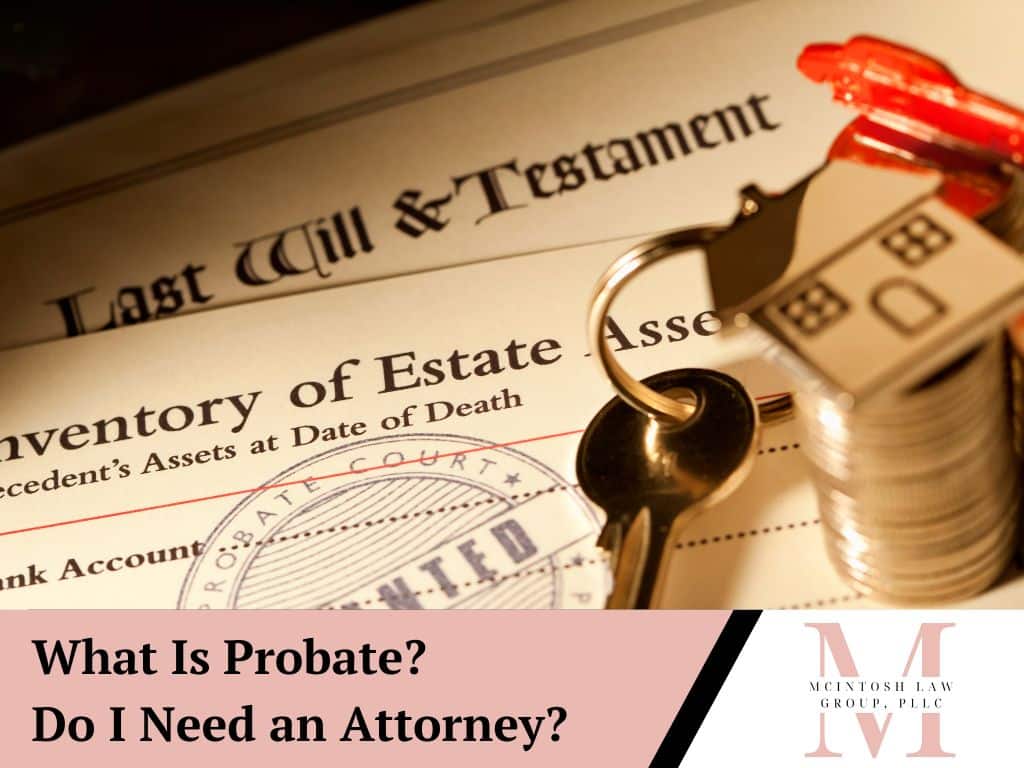What Is Probate? Do I Need an Attorney?

When a loved one passes away, dealing with their estate can be complicated, messy, time-consuming, and emotionally taxing. The probate process involves settling the estate, distributing assets to heirs or beneficiaries, and paying any debt or taxes owed by the estate.
All of this requires careful management to abide by federal and state legal requirements. That’s why it is important to have a probate attorney involved.
Probate attorneys play a critical role in helping the Personal Representative or Personal Representatives of the estate navigate the convoluted process and ensure the deceased person’s assets are appropriately distributed, as dictated in their will or as the state requires.
However, truly understanding the benefits of a probate attorney requires familiarity with the complexities of estate settling, the role of a legal representative, and your state’s regulations.
Let’s take a look at the probate process and why you need an attorney’s assistance.
What Is Probate?
Probate is the legal process in which a deceased person’s assets are passed to beneficiaries. During this process, the deceased person’s liabilities are also resolved. A will is an invitation to probate. It does not mean that the estate is exempt from probate. If the deceased did not create a will during their life, the Florida Statutes determine the beneficiaries of the estate.
The process can be lengthy and complicated. Therefore, the involvement of an experienced probate attorney is essential and, in most cases, required.

In the state of Florida, there are two main types of probate administration: formal and summary. Your attorney will also help you determine which is right for your circumstances.
Formal Administration is the more typical probate proceeding that most people think about when they hear the probate. Estates valued over $75,000 typically are subject to a Formal Administration.
Summary Administration is available when the value of the estate is less than $75,000, and there are no creditors, or if the deceased person has been dead for two years or more.
What Does a Probate Attorney Do?
Identifying Assets
If you’re a family member or friend of the deceased person, you may have questions about how the person’s assets will be distributed (and what those assets are). Answering those questions is a big part of any probate attorney’s role.

Your legal representative will help you identify all of the assets that are subject to probate. These assets may include:
- Bank accounts
- Real estate
- Investments
- Personal property
Filing All of the Necessary Documents
A probate attorney will navigate you and your family through the probate court. It is the probate attorney’s job to determine the necessary documents that need to be filed with the court and when to file necessary documents.
Dispersing Assets to Beneficiaries
Lastly, a probate attorney ensures that all of the assets are distributed according to the terms of the will or the Florida Statutes. The disbursement of assets will only occur after all of the bills and taxes have been paid.
Do I Need a Probate Attorney?

In most probate cases, you will need an attorney’s assistance. It is best to consult with an attorney for any legal issues.
If you are dealing with a complicated case that involves significant debts or tax liabilities, it’s best to hire an attorney. Seeking legal assistance during probate is the best way to address complications, avoid mistakes, and ensure the process moves along in a timely manner.
If you are not sure if you need a probate attorney, schedule a complimentary consultation with our team. We will evaluate your circumstances and provide a recommendation for your next steps forward.
FAQs About Hiring a Probate Attorney
How much does it cost to hire a probate lawyer in Florida?
The cost of hiring a probate lawyer in Florida depends on several factors, including the complexity of the case, the estate’s size, and the attorney’s experience. There are statutory guidelines that many attorneys use in determining the cost of legal services.
The best way to understand what your case will cost is to speak to an attorney. At McIntosh Law Group, PLLC, we provide upfront estimates and explain exactly how our billing structure works. Our goal is always to help clients make a fully informed decision when hiring legal representation.
Who usually pays probate attorney fees?
Typically, the estate of the deceased person is responsible for probate attorney fees and costs. The fees are typically paid out of the assets of the estate, including any cash or property that is subject to probate. If a Personal Representative incurs any expenses in hiring the probate attorney, they are entitled to be reimbursed from the estate.
Additionally, the Personal Representative of the estate is responsible for hiring the probate attorney and overseeing the payment of their fees.
Can an estate be settled without probate in Florida?
In Florida, it is possible to settle an estate without going through probate, but only if certain conditions are met. Most cases involving assets greater than $75,000 will need to go through the formal probate process. Any disputes or challenges to the will must also enter the probate process.
As always, it’s best to consult an attorney in Florida to determine the best course of action for your specific situation.
What assets are not subject to probate?
There are several types of assets that may not be subject to probate. These assets typically have designated beneficiaries and certain types of joint owners.
Examples of assets that may not be subject to probate include:
- Certain jointly owned assets when one owner is still alive
- Life insurance policies that have beneficiaries
- Retirement accounts, such as IRAs and 401(k)s that have beneficiaries
- Payable-on-death accounts
- Transfer-on-death securities
Who doesn’t need probate?
Not all estates are required to go through probate. Generally, if a deceased person’s assets are structured in a way that allows them to be passed on to beneficiaries or heirs with ease, the estate may not need to go through the probate processThis can include living trusts, assets with designated beneficiaries, or jointly owned assets.
Do You Need a Florida Probate Lawyer?

A probate attorney provides valuable guidance and support to clients during difficult times (emotionally, financially, and legally). If your loved one in Florida has recently passed and you have questions about probate, contact our team.
McIntosh Law Group provides critical estate planning and probate services to individuals and families throughout the Tampa Bay area. The process may seem daunting, but we’re here to provide expert guidance through the entire experience.
Get started by scheduling a complimentary consultation with our probate and estate attorney. We’ll put you on the right path, then see you through to the end.

